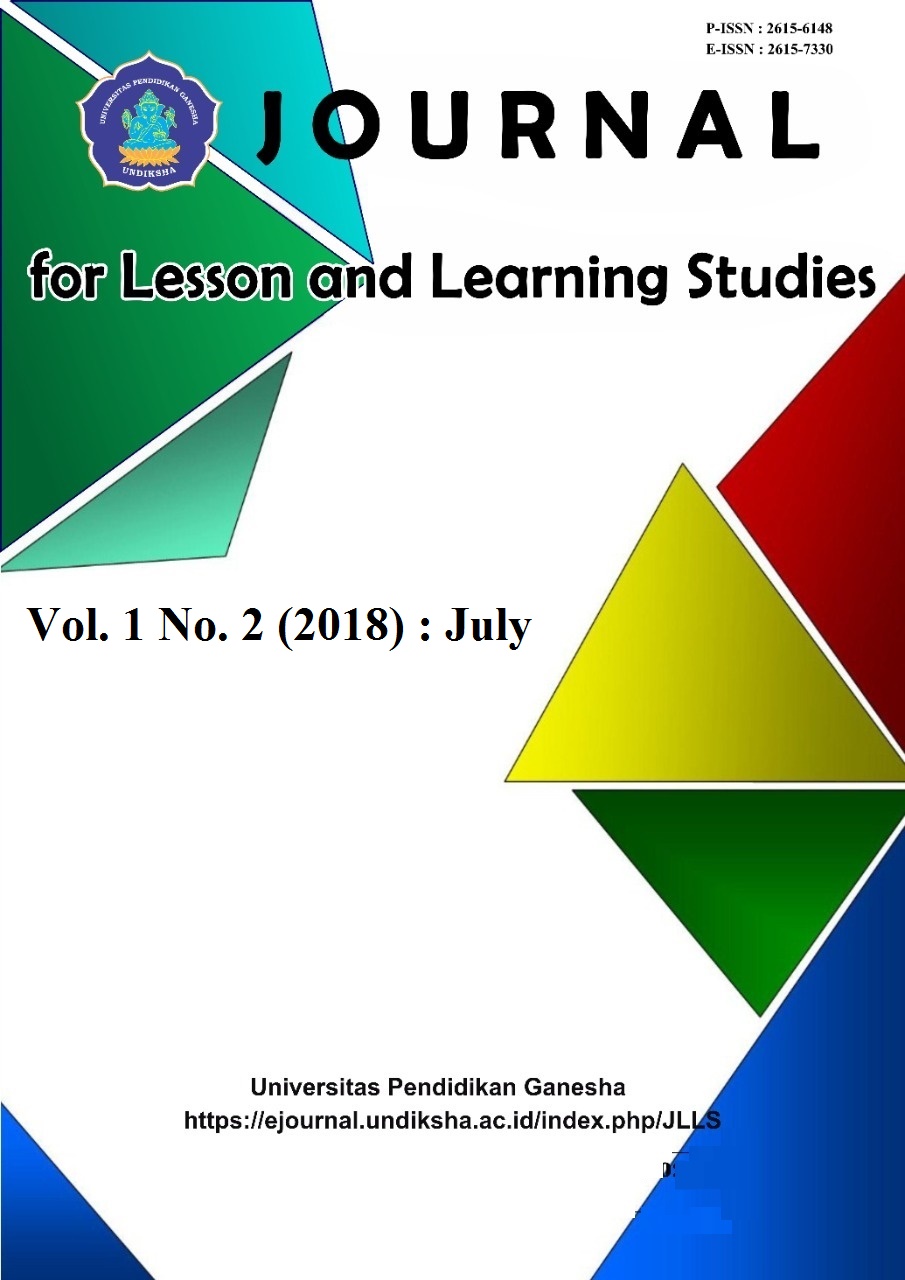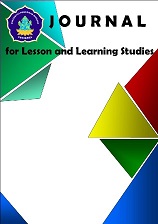PENGARUH MODEL PEMBELAJARAN PROJECT BASED LEARNING BERBANTUAN MEDIA OUTDOOR TERHADAP KOMPETENSI PENGETAHUAN IPA KELAS V
DOI:
https://doi.org/10.23887/jlls.v1i2.14716Abstract
This research’s aims to know the significant difference of science competence between the group students with the Project Based Learning model assisted by outdoor media companed to group of students conventional method for fifth grade students of SD Gugus II in North Kuta academic year of 2017/2018. This research is an experiment with the research design used is non-equivalent control group design. The populations of this research are all of the students of fifth grade which amount 334 students. The sample is determined by random sampling technique. The sample is students of fifth grade A in SD Number 1 Tibubeneng totaled 39 students as the experimental group and students of fifth grade A in SD Number 2 Tibubeneng totaled 33 students as the control group. Data collection technique using testing technique by objective test type multiple choice regular. Technique data abalysis using the t test. The results showed that tcount = 3,890 and at significance level 5% and dk = 70 obtained ttable = 2,000 sehingga tcount = 3,890 > ttable = 2,000. Based on the criteria for testing, then H0 is rejected and Ha is accepted. The velue of science competence group with the Project Based Learning model assisted by outdoor media is 82,18, and group of students with the conventional method is 75,76. Based on these result Project Based Learning model assisted by outdoor media environment affect the science competence fifth grade students of SD Gugus II North Kuta academic year of 2017/2018.References
Agung, A. A. G. 2014. Metodologi Penelitian Pendidikan. Yogyakarta: Aditya Media Publishing.
Agung, A. A. G. 2016. Statistika Dasar untuk Pendidikan. Yogyakarta: Deepublish
Aprianti, Ni Putu Chyntia Dewi. 2017. Pengaruh Model Project Based Learning Berbasis Outdoor Study Terhadap Hasil Belajar IPA Siswa Kelas V SD Gugus II Mengwi Badung Tahun Ajaran 2016/2017. Skripsi.Jurusan Pendidikan Guru Sekolah Dasar. Singaraja: Universitas Pendidikan Ganesha.
Arsyad, Azhar. 2013. Media Pembelajaran. Jakarta: PT Rajagrafindo Persada.
Darmadi. 2013. Metode Penelitian Pendidikan dan Sosial. Bandung: Alfabeta .
Departemen Pendidikan dan Kebudayaan. 2014. Peraturan Menteri Pendidikan dan Kebudayaan Republik Indonesia Nomor 103A Tahun 2014 Salinan Lampiran tentang Pembelajaran Pada Pendidikan Dasar dan Pendidikan Menengah. Jakarta: Departemen Pendidikan dan Kebudayaan.
Kamayani, I. A Diah. 2013. “Pengaruh Model Pembelajaran Project Based Learning Berbantuan Media Tiga Dimensi Terhadap Hasil Belajar IPA di SD Gugus IX Kecamatan Buleleng”. Mimbar PGSD Undiksha., Volume 1, Nomor 1 (hlm 1-10) (diakses tanggal 11 Januari 2018).
Kemendikbud. 2003. Undang-undang Republik Indonesia No. 20 Tahun 2003 tentang Sistem Pendidikan Nasional. Jakarta: Departemen Agama.
Kosasih. 2016. Strategi Belajar dan Pembelajaran Implementasi Kurikulum 2013. Bandung: Yrama Widya
Samatowa, Usman. 2016. Pembelajaran IPA di Sekolah Dasar. Jakarta: PT Indeks
Sani, Ridwan Abdullah. 2014. Pembelajaran Saintifik untuk Implementasi Kurikulum 2013. Jakarta: PT Bumi Aksara.
Setyosari, Punaji. 2015. Metode Penelitian Pendidikan dan Pengembangan. Jakarta: PT Kharisma Putra Utama
Sudijono, Anas. 2015. Pengantar Evaluasi Pendidikan. Jakarta: Rajawali Pers.
Sukardjo, M dan Komarudin Ukim. 2013. Landasan Pendidikan. Cetakan ke-5. Jakarta: PT Raja Grafindo Persada.
Susanto, Ahmad. 2013. Teori Belajar dan Pembelajaran di Sekolah Dasar. Jakarta: Kencana Prenada Media Grup.
Trianto. 2014. Mendesain Model Pembelajaran Inovatif, Progresif, dan Kontekstual. Jakarta: Prenadamedia Grup.
Widiasworo, Erwin. 2017. Strategi dan Metode Mengajar Siswa di Luar Kelas. Yogyakarta: Ar Ruzz Media.
Downloads
Published
How to Cite
Issue
Section
License
Authors who publish with the Journal for Lesson and Learning Studies agree to the following terms:
- Authors retain copyright and grant the journal the right of first publication with the work simultaneously licensed under a Creative Commons Attribution License (CC BY-SA 4.0) that allows others to share the work with an acknowledgment of the work's authorship and initial publication in this journal.
- Authors are able to enter into separate, additional contractual arrangements for the non-exclusive distribution of the journal's published version of the work (e.g., post it to an institutional repository or publish it in a book), with an acknowledgment of its initial publication in this journal.
- Authors are permitted and encouraged to post their work online (e.g., in institutional repositories or on their website) prior to and during the submission process, as it can lead to productive exchanges, as well as earlier and greater citation of published work. (See The Effect of Open Access)





